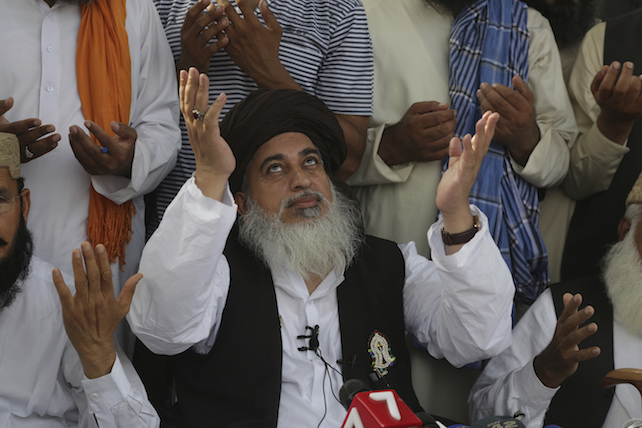The leaders that called for the protest against Asia Bibi’s death sentence reversal are being charged with criminal acts in Pakistan. Pakistan’s Information Minister, Fawad Chaudrhy, announced on Saturday, December 1, 2018, that the leaders of the extremist Muslim Tehreek-e-Labaik Pakistan party (TLP) are charged with terrorism and sedition.
“The TLP has become a continuous threat to the life and properties of the citizens and is doing politics under the guise of religion,” Chaudrhy said prior to the arrests.
Khadim Hussain Rizvi Accused of Calling for Protests
Khadim Hussain Rizvi and other leaders of the TLP are accused of calling for the violent protests that took place over the course of three days following the October 31 Supreme Court announcement that it had ruled to acquit Bibi of blasphemy charges. In order to end the protests, which virtually crippled transportation and communications in Pakistan’s largest cities, the Pakistani government agreed to allow the Supreme Court’s ruling to be appealed. Currently, Bibi is in an undisclosed location and a travel ban has been placed on her. Despite a handful of countries offering her asylum, Bibi’s fate (and consequently the fate of her family) is in limbo at the moment. Several Christian leaders have called for prayer on her behalf.
Initially taken into “protective custody” on November 23, Rizvi is now being charged with terrorism and sedition, Chaudrhy said. Lawmakers and police officers were concerned about another protest the group was planning for martyr’s day on November 25, which is what prompted Rizvi’s original detainment.
Other leaders of the TLP have also been booked under similar charges, in various areas of Pakistan. These leaders include Pir Afzal Wadri, Inayatul Haq Shah, and Hafiz Farooqul Hassan. If convicted of the sedition and terrorism charges, these men could be sentenced to life in prison. Specifically, Rizvi and the other leaders are accused of calling for the protest, making incendiary remarks against Pakistan’s justice system and Prime Minister Imran Khan, and prodding military soldiers to mutiny.
Chaudrhy also said over 3,000 people involved in the protests were taken into custody. As Dawn reports, Chaudrhy does not believe all of these people were directly involved in the violence and destruction, and therefore will likely be released after agreeing not to participate in similar activities in the future. However, those who were involved in the destruction of state property and violence against people will be held under terrorism charges.
The Pakistani Government’s Tenuous Relationship With the TLP
This is not the first time the government has had run-ins with the TLP. In November 2017, the group, which is described as a religiopolitical party, organized a 20-day sit-in at the Faizabad Interchange, a major traffic interchange in Islamabad, Pakistan. Practically paralyzing the movement of Pakistan’s capital city, the TLP was protesting a change in wording to the country’s Elections Bill 2017. The protest, which turned deadly, called for the resignation of Law Minister Zahid Hamid. Hamid did resign after an agreement was forged between the protestors and the government.
Some, including Bibi’s lawyer, have been critical of the Pakistani government’s seeming capitulation to the TLP and their demands. After conceding to the TLP and allowing the Supreme Court’s decision to acquit Bibi to be appealed, Saif ul Mullok, Bibi’s lawyer, said, “What’s painful is the response of the government. They cannot even implement an order of the country’s highest court.”
While it is unclear how the rulings will play out with Rizvi and the other TLP leaders, perhaps their arrests signal an effort on the part of the government to not give in to violent demands from the extremist group.

